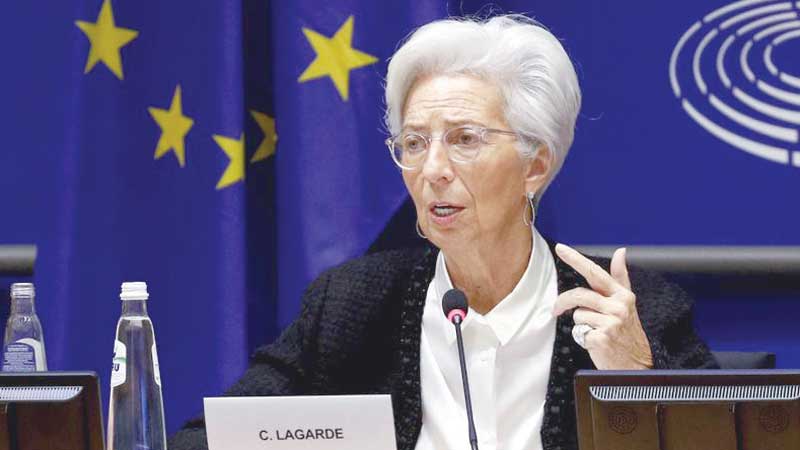

BERLIN: European Central Bank (ECB) President Christine Lagarde is expected to unveil new stimulus measures next week to help restore economic confidence in the coronavirus-hit euro zone and to fend off the threat of deflation posed by a strong euro.
The centrepiece of the measures is likely to include ramping up the ECB’s 1.35 trillion euro ($1.63 trillion) emergency bond-buying programme (PEPP) by a further 500 billion euros and extending the scheme by six months until at least the end of next year.
The PEPP was launched in March at the height of the pandemic’s first wave. After Lagarde in October flagged plans to “recalibrate” the ECB’s response to the worsening pandemic, “the only question is not if but what the ECB will announce” said Carsten Brzeski, ING Bank global head of macroeconomics.
The new stimulus measures are also forecast to include further improvements in borrowing conditions for euro zone banks under the ECB’s targeted longer-term refinancing operations (TLTROs).
The TLTROs have emerged as crucial policy tools in the bank’s battle to defend the euro zone economy against the virus’ impact across the region, as governments ponder extending lockdown measures into the new year. About 12 months into her tenure as ECB chief, Lagarde’s term has been largely dominated by the coronavirus, which emerged early this year in Europe.
The ECB faces additional pressure to act due to the solid gains in the euro, which has helped fuel worries the euro zone could face deflation, as the economic slowdown triggered by the pandemic undercuts inflation, the bank’s prime policy measure.
The euro climbed to a two-and-half year high this week of $1.2084.Up until now, Lagarde has rejected talk of deflation, but she has warned that inflation in the region is likely to remain negative into next year.
The euro zone’s annual inflation rate remained stuck at a negative reading for the fourth consecutive month in November at minus 3 per cent, the European Union’s statistics office Eurostat said.
Consumer prices have now undershot the ECB’s annual inflation target of just below 2 per cent for the last seven years.
Next week’s ECB announcement on fresh emergency measures will also coincide with the bank releasing its new economic and inflation forecasts.
The so-called staff projections indicate how the bank sees economic life in the euro zone changing with the expected roll-out of a vaccine next year.
But it remains an open question whether the Frankfurt-based ECB will move to trim interest rates, and in particular whether it might lower the deposit rate further below zero in a bid to boost bank lending.
— dpa
Oman Observer is now on the WhatsApp channel. Click here



